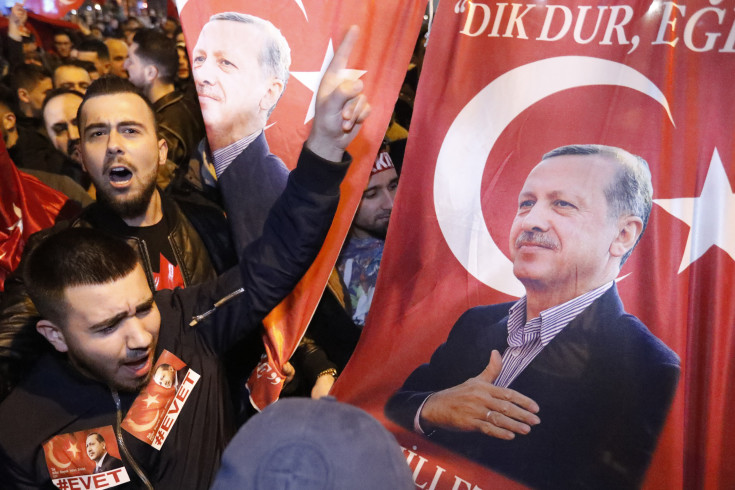Turkey on Monday threatened to impose sanctions against its NATO ally the Netherlands as tensions between the two sides continued to simmer over Amsterdam’s ban on Turkish ministers speaking at political events in Rotterdam.
President Recep Tayyip Erdogan, who is seeking support from Turks in a referendum on boosting his powers, has accused the Dutch government of acting like “Nazi remnants” and said it should face sanctions for barring his ministers from addressing expatriate Turks to drum up votes.
The row marks another low point in relations between Turkey and Europe, further dimming Ankara’s prospects of joining the bloc. It also comes as Turkey is caught up by security concerns over militant attacks and the war in neighboring Syria.
The European Union later called on Turkey to cease “excessive statements” in wake of Erdogan’s remarks.
EU spokesman Margaritis Schinas said: “The EU calls on Turkey to refrain from excessive statements and actions that risk further acerbate the situation.”
Schinas said that “matters of concern can only be resolved through open and direct communication channels.”
He added that it is “essential to avoid further escalation and find ways to calm down the situation.”
German Chancellor Angela Merkel said Monday the Netherlands has her “full support and solidarity” after Turkey’s president used Nazi comparisons to criticize Dutch treatment of Turkish ministers.
Earlier, a source close to the Turkish government told Reuters that sanctions were expected to be discussed when the cabinet of ministers meets at 7 pm (1600 GMT). Ankara’s minister for EU Affairs, Omer Celik, said sanctions were likely.
Apart from any economic measures, a source in Ankara said sanctions could affect cultural activities, and military and technological cooperation.
Turkey summoned the Dutch charge d’affaires on Monday to complain about the ban.
On Sunday, Dutch police used dogs and water cannon to disperse hundreds of protesters waving Turkish flags outside the consulate in Rotterdam.
“The Turkish community and our citizens were subject to bad treatment, with inhumane and humiliating methods used in disproportionate intervention against people exercising their right to peaceful assembly,” a statement attributed to ministry sources said.
The Dutch government barred Turkish Foreign Minister Mevlut Cavusoglu from flying to Rotterdam on Saturday and later stopped Family Minister Fatma Betul Sayan Kaya from entering the Turkish consulate there, before escorting her back to Germany.
Protests then erupted in Turkey and the Netherlands.
Some 400,000 Turkish citizens live in the Netherlands and an estimated 1.5 million Turks live in Germany. The Dutch government said the visits were undesirable and it would not cooperate in their campaigning.
Monday was the third time the Dutch envoy had been called in since Saturday over the row. The Dutch ambassador is on leave and the Turkish foreign ministry says it does not want him back “for some time”.
Dutch direct investment in Turkey amounts to $22 billion, making the Netherlands the biggest source of foreign investment with a share of 16 percent.
Ozgur Altug, chief economist at BGC Partners in Istanbul, said at this stage he did not foresee the row having serious short-term economic consequences.
“However, if the tension escalates and if countries start imposing sanctions against each other, it might have serious implications for the Turkish economy,” he said.
